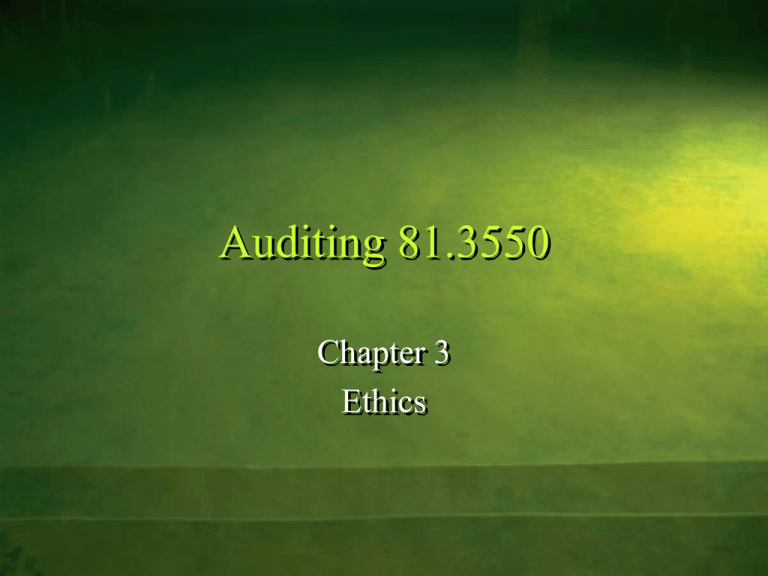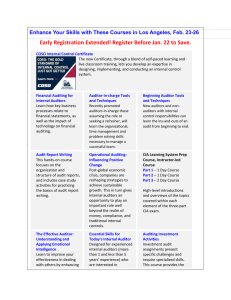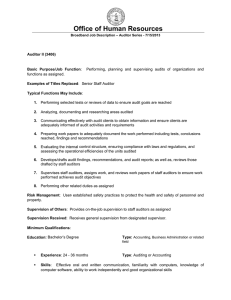Auditing 81.3550 Chapter 3 Ethics
advertisement

Auditing 81.3550 Chapter 3 Ethics Highlights • Describe and explore ethics • look at ethical concerns relating to accountants and typical codes of conduct – – – – – independence confidentiality behaviour requirements integrity and due care professional competence • other rules of conduct Ethics • Set of values or principles • unethical behaviour often the result of selfishness • Misconceptions: – unethical practices = normal businesses – cannot have successful ethical business • Everyone faces ethical dilemmas Code of Ethics • Many organization’s have developed codes to encourage ethical behaviour • Rotary 4 Way Test – Is it the truth? – Is it far to all? Concerned? – Will it build goodwill and better friendships? – Will it be beneficial to all concerned? Ethical Frameworks • Another framework for solving ethical dilemmas 1. Gather relevant facts 2. Identify ethical issues 3. Determine who stakeholders are and how affected by outcome 4. Identify alternatives 5. Identify consequences of each alternatives 6. Decide appropriate action to take Ethical Frameworks • Newspaper Test – Would you want your decision to be covered by the newspaper? – What would the reaction be? Professional & Codes of Conduct • Professional - held to higher standard, going beyond basic standards due to need for public confidence • Professional often provide complex services that users do not have qualification and/or the time to perform such services • Quality of profession key to success How are Public Accountants Encouraged to be Professional? Cont. Ed Practice Inspec. Legal Liability Quality Control Conduct of Acct Firm Personnel CICA Handbook & Guidelines Prof. Code Conduct Securities Comm. Prof. Exams Code of Professional Conduct • Sets standards for members of a particular group • provides benchmark and standards which must be met • Same rules normally apply to all members • Example - all CA’s in Canada same rules General Ideals/Principles • Members should be ethical and serve public interest • Common principles include: – – – – integrity due care confidentiality objective state of mind Specifics • Outlined in Rules or Codes of Professional Conduct & enforceable • Interpretations may be issued to aid in clarity of a particular rule/code • Accounting members not only responsible for their own compliance but also for that of other partners and employees of organization (Firm) Common Specifics • Each professional accounting body has it own set of Rules of Professional Conduct • Commonality between majority of rules Specifics - Independence • Means taking an bias viewpoint • applies to attest engagements • critical to provide value on attest engagements - most critical auditors characteristic • need to have two types – Independence in Fact – Independence in Appearance Independence • In fact - auditor able to maintain unbiased attitude throughout audit process • In Appearance - other outside of the situation must view the auditor as being independent • 4 Components to independence – – – – Financial Mental Attitude Investigative Reporting Financial Independence • Not owning stock in company audited • Not owing a significant mount of money or being owed significant amount by client • Not having a single large client whom financial dependant one Financial Independence • Not being engage and paid by management • Not performing advisory services for client – big issue for firms with consulting services – note permitted to do bookkeeping only (not take part in operations/management) for client but client must be aware of their ultimate responsibility for statements – many firms have now set up separate consulting firms in order to aid in preserving independence Mental Attitude, Investigative Independence & Reporting • Using professional skepticism when evaluating audit evidence and performing audit functions • have enough time and resource to properly perform the audit • audit report and finding must be reported to a high level in the organization to promote action if required Where does the Audit Committee Fit In? • CBCA requires all corporations who trade their securities to the public to have an audit committee • Audit Committee - independent of organizations management • Made up of directors from outside the company (i.e. not company managers) • Aids both internal and external auditors in maintaining independence Where does the Audit Committee Fit In? • Typical activities: – review scope and cost of external audit – review annual report in its entirety – liaison and adjudicate between internal auditors and management – liaison and adjudicate between external auditors and management • Note auditors are selected via shareholder vote Opinion Shopping • Management moves from one auditor to another looking for until they find the “right” someone • 7600 - req’d to report/consult with previous auditing/accounting firm Confidentiality • Rules of conduct cannot disclose client information without client consent • Exception – if info requested by courts (can include all files/documents) • Exception - practice inspections Professional Reputation • Should behave in best interest of profession and the public • One professional accountant should not be publicly critical of another without giving a chance to explain actions Due Care, Integrity & Competence • Legal duty to users of financial statements to perform duties with “due care” • Integrity key to professional accountant’s career • Prof. Accountants required to do min. number of hours of updating each year • Clearly outlined in GAAS – adequate technical training and proficiency required • Need to understand client’s often complex business – if not should decline engagement Advertising • Cannot solicit another firm’s clients (i.e. pursue to convince them to change firms) • Can respond to a request for information • Adverting must be in good professional taste Other Rules • Duty bound to report breaches -if aware of breach of rules need to inform offender of intent to report then report to discipline committee • Cannot have fees based on any type of contingency • Must communicate with prior auditors of client before accepting a new client • Previous auditor should respond in a open/honest manor and allow (with client’s permission) review prior auditors working papers Enforcement • Normally falls under provincial branch of the association • Each association can impose penalties such as: – mention or highlight of process in prof member newsletter – Fines – Require courses to be taken – expulsion




